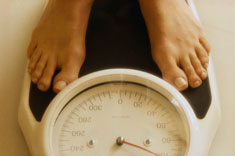 Diabetes is a disorder of metabolism--the way our bodies use digested food for growth and energy. Most of the food we eat is broken down into glucose, the form of sugar in the blood. Glucose is the main source of fuel for the body.
Diabetes is a disorder of metabolism--the way our bodies use digested food for growth and energy. Most of the food we eat is broken down into glucose, the form of sugar in the blood. Glucose is the main source of fuel for the body.
After digestion, glucose passes into the bloodstream, where it is used by cells for growth and energy. For glucose to get into cells, insulin must be present. Insulin is a hormone produced by the pancreas, a large gland behind the stomach.
When we eat, the pancreas is supposed to automatically produce the right amount of insulin to move glucose from blood into our cells. In people with diabetes, however, the pancreas either produces little or no insulin, or the cells do not respond appropriately to the insulin that is produced. Glucose builds up in the blood, overflows into the urine, and passes out of the body. This causes the body to lose its main source of fuel even though the blood contains large amounts of glucose.
What are the signs of diabetes?
- being very thirsty
- urinating often
- feeling very hungry or tired
- losing weight without trying
- having sores that heal slowly
- having dry, itchy skin
- losing the feeling in your feet or having tingling in your feet
- having blurry eyesight
You may have one or more of these signs if you have diabetes, or you may have no signs at all. A blood test to check your glucose levels will show if you have prediabetes or diabetes.
Who gets diabetes?
- people of any age
- people with a family history of diabetes
- most common in older people, overweight and sedentary people, African Americans, Alaska Natives, American Indians, Asian and Pacific Islander Americans, and Hispanic Americans
You can take an online diabetes risk test here.
 Why do you need to take care of your diabetes?
Why do you need to take care of your diabetes?
After many years, diabetes can lead to serious problems in your eyes, kidneys, nerves, and gums and teeth. But the most serious problem caused by diabetes is heart disease. When you have diabetes, you are more than twice as likely as people without diabetes to have heart disease or a stroke.
You can reduce your risk of developing heart disease by controlling your blood pressure and blood fat levels. If you smoke, talk with your doctor about quitting.
Types of Diabetes:
- Type 1 diabetes
- Type 2 diabetes (this type is preventable)
- Gestational diabetes
 Proper disposal of needles and syringes
Proper disposal of needles and syringes
The Sharps Smarts brochure describes how to dispose of needles, syringes, and lancets properly. For information on household hazardous waste disposal, call the County Recycling Helpline at 813-5425.
Other Resources:
